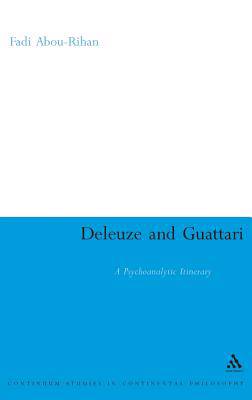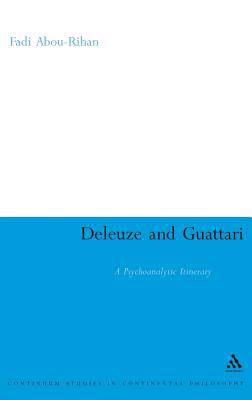
Je cadeautjes zeker op tijd in huis hebben voor de feestdagen? Kom langs in onze winkels en vind het perfecte geschenk!
- Afhalen na 1 uur in een winkel met voorraad
- Gratis thuislevering in België vanaf € 30
- Ruim aanbod met 7 miljoen producten
Je cadeautjes zeker op tijd in huis hebben voor de feestdagen? Kom langs in onze winkels en vind het perfecte geschenk!
- Afhalen na 1 uur in een winkel met voorraad
- Gratis thuislevering in België vanaf € 30
- Ruim aanbod met 7 miljoen producten
Zoeken
€ 373,45
+ 746 punten
Omschrijving
Most commentators judge Deleuze and Guattari's Anti-Oedipus as either a Medusa into whose face psychoanalysis cannot but stare and suffer the most abominable of deaths or a well-intentioned but thoroughly misguided flash in the pan. Fadi Abou-Rihan shows that, as much as it is an insightful critique of the assimilationist vein in psychoanalysis, Anti-Oedipus remains fully committed to Freud's most singular discovery of an unconscious that is procedural and dynamic. Moreover, Abou-Rihan argues, the anti-oedipal project is a practice where the science of the unconscious is made to obey the laws it attributes to its object. The outcome is nothing short of the "becoming-unconscious" of psychoanalysis, a becoming that signals neither the repression nor the death of the practice but the transformation of its principles and procedures into those of its object. Abou-Rihan tracks this becoming alongside Nietzsche, Winnicott, Feynman, Bardi, and Cixous in order to reconfigure desire beyond the categories of subject, lack, and tragedy. Firmly grounded in continental philosophy and psychoanalytic practice, this book extends the anti-oedipal view on the unconscious in a wholly new direction.
Specificaties
Betrokkenen
- Auteur(s):
- Uitgeverij:
Inhoud
- Aantal bladzijden:
- 180
- Taal:
- Engels
- Reeks:
- Reeksnummer:
- nr. 95
Eigenschappen
- Productcode (EAN):
- 9781847063717
- Verschijningsdatum:
- 1/01/2009
- Uitvoering:
- Hardcover
- Formaat:
- Genaaid
- Afmetingen:
- 157 mm x 234 mm
- Gewicht:
- 430 g

Alleen bij Standaard Boekhandel
+ 746 punten op je klantenkaart van Standaard Boekhandel
Beoordelingen
We publiceren alleen reviews die voldoen aan de voorwaarden voor reviews. Bekijk onze voorwaarden voor reviews.









